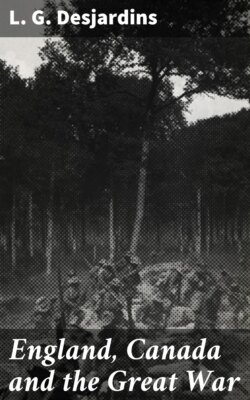Читать книгу England, Canada and the Great War - L. G. Desjardins - Страница 24
На сайте Литреса книга снята с продажи.
The Nationalist Error.
ОглавлениеTable of Contents
The leaders of our Nationalist School have for years strenuously laboured to pervert the mind of our French-Canadian compatriots by the false pretensions that we were, in some mysterious way, coerced to participate in the European War. Even previous to the days of the South African conflict, they boldly took the stand that Canada should, on no account, and under no circumstances whatever, participate in what they called the Wars of the Empire—les guerres de l'Empire. Canada, they affirmed, had only to defend her own territory if attacked.
Fully appreciating how insidious and dangerous such theories were, I endeavoured to show, as forcibly as I could, that there had been no attempt by England at coercion of this Dominion to help her in the struggle against Germany. Of course, as previously explained, Great Britain being at war with the German Empire, the whole British Empire was at war. But no one in England ever intended to propose to force the colonies to engage actively into the fight. The Imperial Parliament would certainly not have taken into consideration any such proposition.
But is it not plain and beyond discussion that we, ourselves, had the undoubted right to intervene in the war to the extent that we would consider it our bounden duty to do so?
Evidently we could not remain neutral in the great conflict. At the very moment that Great Britain was at war with Germany, Canada, a British Colony, was part and parcel of the belligerent Sovereign State, the British Empire. By an incredible misconception, the Nationalist leaders confounded neutrality with non-participation in the war, if we had so decided.
To be, or not to be, neutral, was not within our constitutional rights. If Germany, either by land or by sea, had attacked our territory, as she had the undoubted belligerent right to do, would it have availed us an iota to implore her mercy by affirming that we were neutral? Could we have pretended that she was violating neutral territory?
No one with the least notion of International Law would for a moment hesitate to give the true answers to those questions.
But the very different question to participate, or not, in the war, was for us alone to decide according to our constitutional charter. We have freely, deliberately, decided to do our share in the great war. We continue and persevere in our noble task, freely and deliberately.
It is admitted by all that under the actual constitutional organization of the Empire, the Imperial Parliament could not require the autonomous colonies to participate in the war. But no one can assuredly deny to that Parliament the right, in the case of an imminent peril, to formulate the desire that the autonomous colonies would help Great Britain to conjure the threatened calamity.
But, in the present case, the Imperial Parliament has not even been under the necessity of expressing such a legitimate wish, for the obvious reason that the colonies at once took their patriotic stand in favor of the cause of England and her Allies. If the colonies had not so decided, of their own free will, it is most likely that the Imperial Parliament would not have expressed the wish for the assistance of the Dominions overseas.
The hearty support granted by the colonies to Great Britain, to develop its full value, had to be spontaneous, enthusiastic. Such it was, such it is, and such it will be to the last day of the conflict which victorious conclusion we are so strongly determined to achieve.
